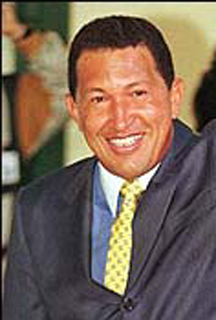CARACAS (Reuters) – Hundred dollar oil, a brighter economic outlook and growing popularity after a tough couple of years are just a few reasons Venezuela’s President Hugo Chavez has to be cheerful as he plans a re-election bid.
Add to that list bickering among opposition parties and the bombing of Libya by Western nations, and the socialist stalwart has plenty to help counter popularity-sapping problems such as high inflation and shoddy public services.
Any number of factors could yet upset Chavez’s plan to do away with capitalism in South America’s biggest oil exporter, but for now the former soldier looks like the favourite ahead of a December 2012 election that would give him a new six-year term.
With typical bombast, Chavez predicts his next election victory would be greater than even his last, when he won more than 60 per cent of the vote.

“We are going to wipe them out like never before,” Chavez told cheering supporters gathered in the rain outside his presidential palace in downtown Caracas last Wednesday, marking nine years since he survived a coup attempt against him.
The election is likely to be much closer than that, but Chavez has the upper hand at the moment — the fractious opposition will not choose a candidate until February next year, while the incumbent has already begun his campaign with what is likely to be a long spending spree.
Citing his hands-on performance during floods late last year, most polls put Chavez’s ratings above 50 percent, up several points since a long recession drove his popularity down to its lowest point for years in 2010.
Despite that, his ratings have tended towards gradual decline since peaks of about 70 per cent a few years ago,
“Today Chavez has an advantage, he is the candidate and he has got money,” said Luis Vicente Leon, of pollster Datanalisis. “But the Chavez heading to the 2012 election is infinitely weaker than in any other electoral process in the past.”
When Libyan leader Muammar Gaddafi’s forces began shooting protesters in February, Venezuela’s opposition seized on Chavez’s warm friendship with Gaddafi in the hope of damaging his image.
That may still happen, but for now it is Chavez who is reaping the benefits as his coffers fill from higher oil income, in part caused by the Libya crisis, and as his regular denunciation of the West’s attacks as “imperial aggression” weakens his pro-US opponents.
“Every day more, the bourgeoise here is pawn of the empire, our adversary,” Chavez said recently. “Ask one of them what they think of the bombardment of Libya, the invasion of Afghanistan. They are the spokesmen of the empire.”
A former coup-leader like Gaddafi, Chavez won power at the ballot box in 1998 and has a strong record in elections, especially when he channels billions of dollars in oil revenue into projects for the poor, stimulating consumption.
The economy officially returned to growth at the end of last year. Oil prices are up a third since December and Chavez was optimistic enough recently to double to 4 percent the government’s maximum forecast for 2011 economic growth.
“Oil prices should keep strengthening and stabilizing at a fair level,” he said, citing violence in Libya and growth in China as the main drivers. “This year, aggregate demand has increased 33 per cent. And this will keep going up,” he added, saying public spending was behind the rise.
Private economists have also raised their growth forecasts for Venezuela this year, although many think the private sector is too damaged by years of nationalizations to invest enough for the economy to expand as fast as its neighbours.




